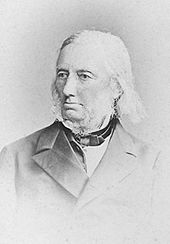Johann Heinrich Friedrich Karl Witte
Johann Heinrich Friedrich Karl Witte , mostly: Karl Witte or Carl (o) Witte (* July 1, 1800 in Lochau , Saalkreis ; † March 6, 1883 in Halle ) was a German lawyer and one of the most important Dante researchers and Dante translators 19th century.
Life
Karl Witte was born on July 1, 1800 in the parsonage in Lochau near Halle (Saale). The pastor Karl Heinrich Gottfried Witte raised his son with very special commitment and success, so that he passed the Matura at the Thomas School in Leipzig at the age of 10 and received his first doctorate in Gießen in 1813 . He completed legal studies at the University of Heidelberg in 1816 and in the following year he acquired the legal teaching qualification at the University of Berlin . Supported by King Friedrich Wilhelm III. Witte went on a study trip to Italy, from which he returned in 1821. He then began an academic career as a lawyer at the Universities of Breslau , initially as a private lecturer, in 1823 as an associate professor and from 1829 as a full professor. In 1833 he was transferred to the University of Halle as a professor of Roman law . The father Wittes described the method of education of his son to a child prodigy in the book Karl Witte or educational history of the same (2 volumes, 1819), but this representation earned in Germany above all criticism and was soon forgotten. Since 1834 Witte belonged to the Halle Masonic lodge Zu den three Degen .
In Breslau he made close friends with the journalists and writers Karl Schall and Carl von Holtei as well as the Dante specialists Karl Ludwig Kannegießer and Prince Johann of Saxony (later King Johann of Saxony; pseudonym: "Philalethes"). Witte did not develop a special profile as a lawyer, but with his commitment to philologically high-ranking editions of the Divina Commedia (German: The Divine Comedy ) by Dante Alighieri , he also founded the German Dante Society in 1865 . In 1850 he was admitted to the Florentine Accademia della Crusca .
On June 28, 2008, a memorial plaque was unveiled in honor of the “child prodigy of Lochau” at the house where he was born in Kirchwinkel. This is intended to set a permanent monument to the most famous citizen of Lochau. Another memorial plaque has been on Witte's former home in Halle, Große Brauhausstrasse 16, since 2007.
plant
- Conchoïdis Nicomedeae Aequatio Et Indoles, Baier, Gottingae 1813, OCLC 64406383 (Göttingen, Univ., Univ.-Schr., 1813, 42 pages. Dedication in French. "Quas Examini Submisit Et Figuris Illustravit Carolus Witte").
- Ad l [egem] X dig. de usufr [uctu] accr [escendo]. Heidelberg, 1818, OCLC 311971501 ( Dissertation University of Heidelberg 1816, 38 pages).
literature
- Hermann Witte: Karl Witte. A life for Dante. From child prodigy to legal scholar and the greatest German Dante researcher (on the occasion of the 650th anniversary of Dante Alighieri's death in 1971). Arrangement, Ed. Hans Haupt. Christians, Hamburg 1971 ISBN 3-7672-0011-2
- Leopold Witte: Witte, Karl . In: Allgemeine Deutsche Biographie (ADB). Volume 43, Duncker & Humblot, Leipzig 1898, pp. 595-599.
- Dieter Lamping : The translator as an international author. The Dante translator Karl Witte, 1800-1883, in translator research. New contributions to the literary and cultural history of translation. Ed. Andreas F. Kelletat , Aleksey Tashinskiy, Julija Boguna. Frank & Timme , 2016, pp. 71–81
Web links
- Literature by and about Karl Witte in the catalog of the German National Library
- Works by and about Karl Witte in the German Digital Library
- estate
- Excerpts from Witte's Dante translation
- Entry on Johann Heinrich Friedrich Karl Witte in the Catalogus Professorum Halensis
Individual evidence
- ^ Dante Alighieri, Karl Witte: Inferno. The great stories of mankind. Verlag CH Beck, Munich 2007, p. 120.
- ↑ Member list of the Crusca
- ↑ Memorial plaque for Karl Witte , message from July 4, 2007 on the website of the city of Halle (Saale), accessed on October 27, 2010
| personal data | |
|---|---|
| SURNAME | Witte, Johann Heinrich Friedrich Karl |
| ALTERNATIVE NAMES | Witte, Karl; Witte, Carl |
| BRIEF DESCRIPTION | German lawyer, Dante researcher and writer |
| DATE OF BIRTH | July 1, 1800 |
| PLACE OF BIRTH | Lochau , Saalekreis |
| DATE OF DEATH | March 6, 1883 |
| Place of death | Hall |

